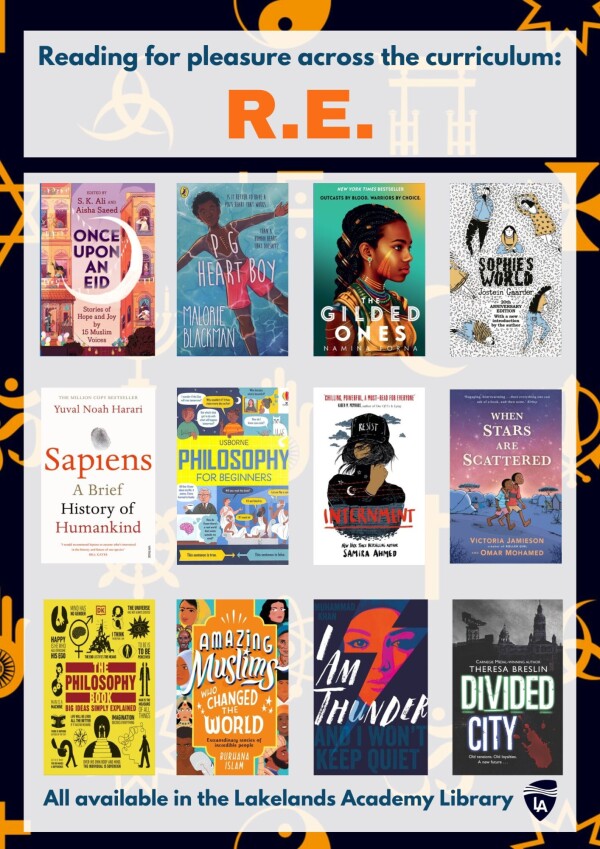Religious Studies
Click here to view our Religious Studies staff (Faculty of World Studies)
Lakelands students study a broad and ambitious curriculum, covering all six major world religions and debating contemporary issues in both Philosophy and Ethics. The curriculum is rich in skills and knowledge and is focused on understanding the beliefs and practices of faiths as well as exploring wider moral concepts. The curriculum is delivered in four parts each year: the study of two religions, a philosophical unit and ethical unit each year across the key stage. Through their study of RS, they will learn the significance of key concepts relevant to both their immediate lives and also as they develop into adults. These include faith, diversity, tolerance, the lens in which they view the world. They will also practice core skills, evaluation, debate and self-reflection. There is progression between Key Stage 3 and 4, as students strengthen key knowledge and skills over time that prepare them for the increased challenge and complexity of GCSE.
RS, Philosophy and Ethics is a subject that forms the bedrock of our understanding of the culture in which we live as well as the wider world around us. The content covered gives students the opportunity to explore issues at a local, national and international level from global faiths to faith in the UK, Humanism, philosophical debate and moral challenges. This range of content offers the opportunity to explore different peoples’ perspectives on issues and events and think critically about the world in which they live. Our curriculum is carefully sequenced to give students a broad understanding of all aspects of faith and diversity of belief, as well as being able to make links to other societies, cultures and world events.
Our students are encouraged to be curious and independent learners, with the ability to make valid, reasoned, and evidenced judgements using transferable skills that can equally be applied to current day issues. They are provided with regular opportunities to develop their understanding and appreciation of important religious and ethical concepts such as end of life, if God exists, utilitarianism and stewardship of the planet. These concepts unlock the door for students to be able to ask leading questions, analyse information and convey their views in a methodical and structured way. These skills are honed and developed progressively through the curriculum to create lifelong thinkers, confident in communicating their views, both in writing and verbally. Following the guidance of the Shropshire SACRE units of study are:
Course overview
Each year at KS3 there are four units of study:
Year 7:
1) Understanding the world of faith and secularism including: What difference does it mean to be non religious in Britain today? (from SACRE)
2) Christianity including the key unit question: What does it mean for Christians to believe in God (from SACRE)
3) Philosophy and ethics unit with the focus on rights and responsibilities including, worldview and good, bad, right, wrong how do I decide? (from SACRE)
4) Islam including the key unit question What is good and what is challenging about being a Muslim teenager in Britain today? (from SACRE)
Year 8:
1)Judaism including the key unit question What is good and what is challenging about being a Jewish teenager in Britain today (optional question from SACRE)
2) Philosophy including the key unit question Should happiness be the purpose of life? (from SACRE)
3) Sikhism including the key unit question How are the Sikh teachings of equality and service put into practise today? (from SACRE)
4) Ethics including the key unit question Why is there suffering? Is there any good solutions? (from SACRE)
Year 9:
1) Hinduism including the key unit question Why don’t Hindus want to be reincarnated and what do they do about it? (from SACRE)
2) Philosophy/ stewardship including the key unit question Should Christians be greener than everybody else? (from SACRE)
3) Buddhism including the key unit question The Budda: how and why do his experiences and teachings have meaning for people today? (from SACRE)
4) Yad Vashem
KS4 students follow the AQA RE Full Course GCSE with the religions studied being Christianity and Islam. The four themes are Family and Religion, Conflict and Religion, Human Rights and Religion and Crime and Religion. For students who have not opted for RS as an options subject they receive their statutory RS entitlement through two PM registrations a week where students follow the AQA short course GCSE module, with the potential to be entered for examination at the end of Year 11.
Arrangements for withdrawing pupils from Religious STUDIES and Collective Worship
Religious Studies follows the Shropshire Agreed Syllabus. It allows pupils to enquire into and gain an appreciation of, the beliefs and practices of the major world religions whilst finding its greater emphases in Christianity. Matters of moral decision-making and ethical behaviour are considered.
Parents and carers are allowed by law to withdraw their children from these aspects of the curriculum, but only on the grounds of religious conviction.
For more information
Shropshire agreed Religious Education syllabus
Please click here to view the AQA RS Syllabus.
If you require any further information about the Religious Studies curriculum at Lakelands please click here to contact the Faculty Leader for World Studies.
Read Around The Curriculum

